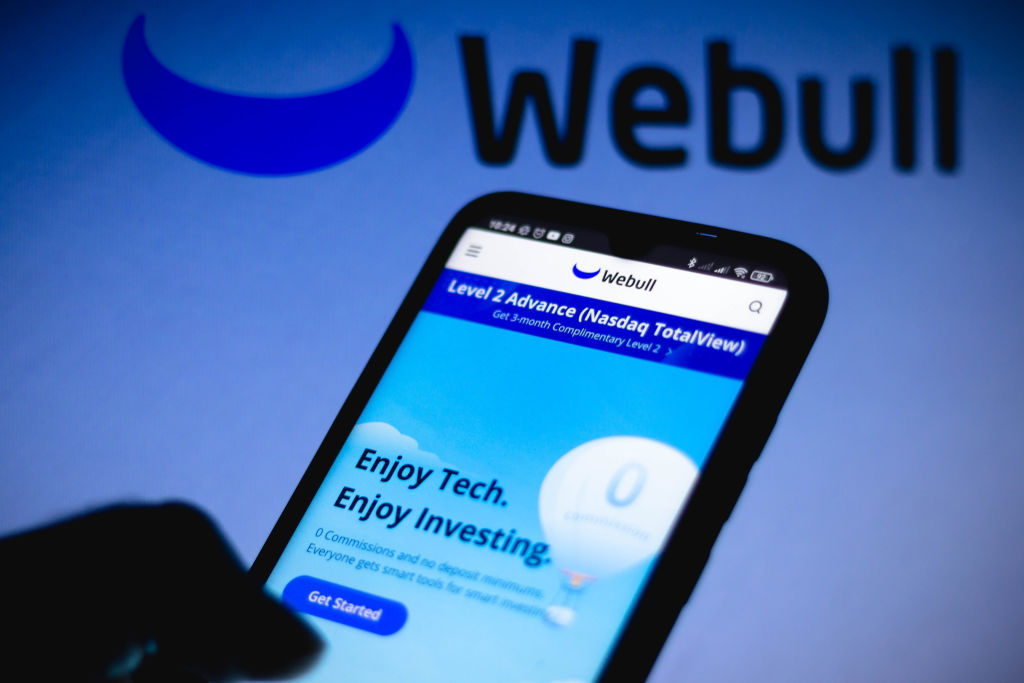The Best Options Trading Platforms
Among a sea of possibilities, here are five of the best options trading platforms for investors.

Profit and prosper with the best of Kiplinger's advice on investing, taxes, retirement, personal finance and much more. Delivered daily. Enter your email in the box and click Sign Me Up.
You are now subscribed
Your newsletter sign-up was successful
Want to add more newsletters?

It's not an easy task to identify the best options trading platforms among a seemingly endless number of choices.
As an investor, getting your selection right is vital: The best options trading platforms can help you maximize your investment potential.
We'll take a deep dive into five of the best options trading platforms, including distinct features and potential drawbacks.
From just $107.88 $24.99 for Kiplinger Personal Finance
Become a smarter, better informed investor. Subscribe from just $107.88 $24.99, plus get up to 4 Special Issues

Sign up for Kiplinger’s Free Newsletters
Profit and prosper with the best of expert advice on investing, taxes, retirement, personal finance and more - straight to your e-mail.
Profit and prosper with the best of expert advice - straight to your e-mail.
We'll examine pros and cons so you can identify the one most suitable for your objectives and confidently embark on a rewarding journey into the world of call options and put options.
Here are five of the best options trading platforms for investors.
Robinhood

Pros:
- A comprehensive range of investment options: Robinhood offers a diverse array of investment choices, providing ample opportunities for portfolio diversification.
- User-friendly interface: The platform's intuitive layout makes it accessible to investors of all experience levels, including beginners.
- Educational resources: Access a wealth of educational materials to enhance your understanding of the markets and improve your investing acumen.
Cons:
- Limited analytical tools: Robinhood's tools for profit-and-loss modeling and detailing Greeks for complex, multi-leg strategies are less robust compared to other platforms.
- Payment for order flow: Robinhood relies on payment for order flow (PFOF), which can lead to wider bid/ask spreads and less favorable executions for options trades.
InteractiveBrokers

Pros:
- Versatility and global market access: InteractiveBrokers caters to investors with diverse needs, offering advanced analytical tools and access to global markets.
- Robust research: Gain access to in-depth market research and analysis, enabling you to make informed investment decisions.
- Professional-grade platform: Ideal for seasoned investors seeking advanced features and tools.
Cons:
- Learning curve: The platform's extensive features might require a learning curve, especially for investors new to the world of options trading.
Webull

Pros:
- Seamless experience: Webull offers a smooth and user-friendly platform, suitable for investors of all levels.
- Paper trading: Practice risk-free with Webull's paper trading feature, allowing you to refine your strategies before committing real funds.
- Advanced charting: Benefit from advanced charting tools for technical analysis and trend identification.
Cons:
- Customer support: Some users have reported limited customer support options, potentially affecting timely resolution of issues.
- Educational resources: While Webull offers educational materials, they might not be as comprehensive as other platforms, especially for in-depth research.
Thinkorswim (by Charles Schwab)

Pros:
- Advanced tools: Thinkorswim stands out with its advanced charting, technical analysis and customizable trading strategies, empowering investors with sophisticated tools.
- Extensive research: Access a wealth of research tools and data for thorough analysis and market insights.
- Professional-grade platform: Ideal for seasoned investors seeking robust features and tools.
Cons:
- Learning curve: The platform's advanced features might require time and effort to fully grasp, especially for investors transitioning to more complex trading strategies.
- Complexity for novices: Beginners might find the platform overwhelming due to its professional-grade tools and extensive capabilities.
Tastytrade

Pros:
- Built for retail traders: Created by the same team that developed TD Ameritrade's thinkorswim platform, tastytrade (formerly tastyworks) was designed specifically with retail traders in mind.
- User-friendly commission structure: Tastytrade doesn't charge commission for closing positions (only opening positions) and caps fees at $10 per leg for any options trade, no matter the size of the trade. This results in a truly competitive fee structure.
- Fundamental analysis: Although tastytrade is all about option strategies, it includes a fundamental analysis tab on both its desktop and its browser platforms.
- Focus on trading rather than investing: Tastytrade offers robust option analytics and tools for traders, allowing for relatively pain-free position creation and trade management.
Cons:
- Focus on trading rather than investing: This is both a pro and a con. Investors may feel underwhelmed, as there are limited investment choices.
FAQs about the best options trading platforms
- Are these platforms suitable for both stock and options trading? Absolutely! All mentioned platforms support both stock and options trading, offering comprehensive investment options.
- Do these platforms offer mobile trading options? Yes! Each platform provides mobile trading apps, enabling you to stay connected to the markets and execute trades on the go.
- Are commission fees applicable for all trades? While some platforms offer commission-free trades, others might charge fees for certain types of transactions. It's essential to review the fee structure of each platform.
Related content
Profit and prosper with the best of Kiplinger's advice on investing, taxes, retirement, personal finance and much more. Delivered daily. Enter your email in the box and click Sign Me Up.

Jared Hoffmann is a highly respected financial content creator and options expert, holding a journalism degree from San Francisco State University. Formerly a Senior Options and Day Trading Editor and on-air personality at Money Morning, he excels in delivering comprehensive options education, technical analysis, and risk management education to traders.
-
 4 High-End Experiences Worth the Splurge After 50
4 High-End Experiences Worth the Splurge After 50These curated date ideas provide the perfect backdrop for couples ready to enjoy the very best that the world has to offer.
-
 Health Care Stocks Have Sagged. Can You Bet on a Recovery?
Health Care Stocks Have Sagged. Can You Bet on a Recovery?The flagging health care sector has perked up a bit lately. Is it time to invest?
-
 Costco's Auto Program: Can Membership Pricing Really Save You Money on a Car?
Costco's Auto Program: Can Membership Pricing Really Save You Money on a Car?Costco's Auto Program can simplify the car-buying process with prearranged pricing and member perks. Here's what to know before you use it.
-
 Health Care Stocks Have Sagged. Can You Bet on a Recovery?
Health Care Stocks Have Sagged. Can You Bet on a Recovery?The flagging health care sector has perked up a bit lately. Is it time to invest?
-
 Your Retirement Age Is Just a Number: Today's Retirement Goal Is 'Work Optional'
Your Retirement Age Is Just a Number: Today's Retirement Goal Is 'Work Optional'Becoming "work optional" is about control — of your time, your choices and your future. This seven-step guide from a financial planner can help you get there.
-
 Have You Fallen Into the High-Earning Trap? This Is How to Escape
Have You Fallen Into the High-Earning Trap? This Is How to EscapeHigh income is a gift, but it can pull you into higher spending, undisciplined investing and overreliance on future earnings. These actionable steps will help you escape the trap.
-
 I'm a Financial Adviser: These 3 Questions Can Help You Navigate a Noisy Year With Financial Clarity
I'm a Financial Adviser: These 3 Questions Can Help You Navigate a Noisy Year With Financial ClarityThe key is to resist focusing only on the markets. Instead, when making financial decisions, think about your values and what matters the most to you.
-
 Dow Absorbs Disruptions, Adds 370 Points: Stock Market Today
Dow Absorbs Disruptions, Adds 370 Points: Stock Market TodayInvestors, traders and speculators will hear from President Donald Trump tonight, and then they'll listen to Nvidia CEO Jensen Huang tomorrow.
-
 Private Capital Wants In on Your Retirement Account
Private Capital Wants In on Your Retirement AccountDoes offering private capital in 401(k)s represent an exciting new investment opportunity for "the little guy," or an opaque and expensive Wall Street product?
-
 It's Time to Bust These 3 Long-Term Care Myths (and Face Some Uncomfortable Truths)
It's Time to Bust These 3 Long-Term Care Myths (and Face Some Uncomfortable Truths)None of us wants to think we'll need long-term care when we get older, but the odds are roughly even that we will. Which is all the more reason to understand the realities of LTC and how to pay for it.
-
 Fix Your Mix: How to Derisk Your Portfolio Before Retirement
Fix Your Mix: How to Derisk Your Portfolio Before RetirementIn the run-up to retirement, your asset allocation needs to match your risk tolerance without eliminating potential for growth. Here's how to find the right mix.